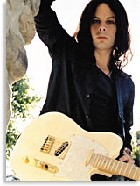
NO matter how good you think you are, you’re no Richie Kotzen. Like a superhero, Kotzen uses his powers for good, coming to the rescue for bands such as Poison, and more than filling the hyper-speed picking shoes of Paul Gilbert in Mr. Big. Add to that his collaboration with Stanley Clarke and Lenny White on the jazz-fusion project Vertu, and it’s undeniable that versatility and chops are Kotzen’s middle name.
With 14 solo albums and a penchant for shred, soul, and blues, Kotzen has the rare ability to play one note or a zillion, and make you feel it. His latest release, Get Up, marks the evolution of an artist in transition. We recently caught up with him to discuss it.
Vintage Guitar: What was the turning point for you as a musician?
Richie Kotzen: I think singing has helped me the most. Once I embraced it and felt comfortable with it, it changed my guitar playing for the better. It was like I had another instrument, another way to express myself. A lot of times, a guitar player who doesn’t have vocal sensibilities will end up stepping on the singer, which is not what you want to do! Singing helps me understand and balance things between the two.
Besides singing, were there any guitar epiphanies?
By the time I joined Poison, I’d made three of my own records and I think I was prepared as a musician to do something different.
Getting away from the shred stuff…
Yeah, and that kind of happened naturally. I don’t think it was a conscious effort. All of a sudden I just stopped playing that way. I stopped playing like a teenager and started playing like a grown-up (laughs)!
What inspires you?
Getting away from music. In the past I was always one of those musicians who was constantly playing. Then my interest in music changed. It went from the mechanics of music to the art of music. I got more interested in writing songs and recording and making records than learning about the guitar. Now, after making records for all these years, getting away from it is the best. I’ll go a month without even messing with a guitar. Then, when I get back to the music, I feel inspired. I feel like I have something to write about.
Talk about your latest release, Get Up.
My previous record, Change, was written over the course of a year or so. I’d write a song, record it, then work in my backyard. With Get Up, I didn’t have any songs that I liked, so I had to start over. I got into writing mode, got a bunch of ideas, and felt I had enough for a record. I literally booked myself in my own recording studio. I went in and did it as if I didn’t have my own studio. I didn’t have the luxury of taking all day. I went in and did it, and it came out a lot more cohesive in a lot of ways. It sounds like all the songs are recorded at the same time, which I haven’t done in awhile.
I wanted to make it like my original records, like Fever Dream or Mother Head’s Family Reunion – guitar, bass, drums, and a voice. That’s what I wanted to do with this record, go back to where I started, musically. I wanted to make one cohesive sound that would encompass who I am. If someone were to ask, “Who is Richie Kotzen?,” I can hand them Get Up.
Your live set has a blue-eyed soul vibe. You close with the soul classic “Losing You,” and it fits right in.
I’m just doing what I do. I don’t know what the hell to call it. In a way, it has always been a problem for me because what I do doesn’t necessarily fit into a standard formula of what’s being sold. It makes it a challenge and makes it difficult in some ways. Once people hear it, they seem to like it. It’s kind of frustrating, trying to find someone willing to go out on a limb, push it, and get it out there.
Does that bother you?
It can’t really bother me because I can’t change who I am. I understand that I’m not a teen pop [artist]. I get that I’m a guitar player who sings and writes songs. I’m soulful. I’ve been told that I have that sound. If there’s a market for that, great. I know I’m selling records, because I’m getting paid. So at some level, I’m kind of doing it. It’s just that I’m not doing it on the level of Bruce Springsteen.
You now have your own commercial recording facility.
Two years ago, I bought a building in North Hollywood and built a studio. Not necessarily because I wanted to be in the studio business, but because of the relationships that could be developed by having a facility where people could come and work. The concept of production has always been very attractive to me. The idea of finding a band I could develop and get involved with on that level is something I really want to do. The studio is all part of that plan. We’ve had a lot of great clients.
This article originally appeared in VG‘s Nov ’04 issue. All copyrights are by the author and Vintage Guitar magazine. Unauthorized replication or use is strictly prohibited.



